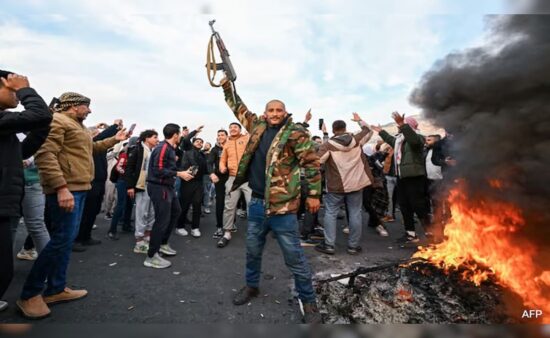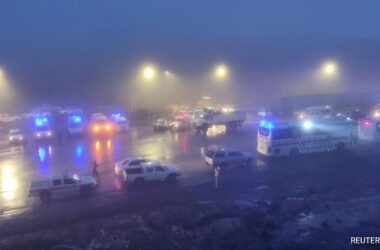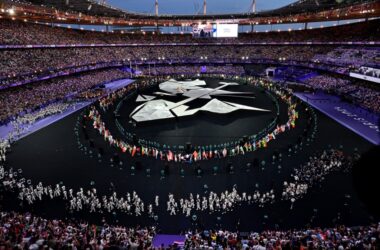
Few might have foreseen Bashar al-Assad’s dramatic ouster as 2024 drew to an in depth. For years, Syria’s battle strains had been frozen underneath a fragile ceasefire brokered by Russia and Turkey in 2020. But, Assad’s downfall—after his household’s iron grip over Syria for over 5 a long time—has shaken the area to its core. Lina Khatib of London-based assume tank, Chatham Home, writing in Overseas Coverage, likened it to the autumn of the Berlin Wall in 1989, calling it “an earthquake within the regional order”.
The explanations for Assad’s collapse are as a lot about Syria as they’re about its ophthalmologist ex-president’s patrons—Russia, slowed down in Ukraine, had neither the assets nor the resolve to again Assad, and Iran’s proxies throughout the area have been severely weakened by Israeli air strikes. Sensing the second, insurgent forces led by Hayat Tahrir al-Sham (HTS), a bunch with roots in Al-Qaeda, mounted a ferocious offensive. Assad’s military, battered by years of corruption, desertions and low morale, folded within the face of the HTS’s blitz. Predictably, Western powers have swooped in to form Syria’s political future and at the moment are vying to affect the make-up of the following authorities.
From the relative calm of India or from the peaceable Western European capitals, it is tempting to ask: why is the Arab world perpetually at struggle with itself? Why does it spawn so many extremist teams? Why has it been trapped in cycles of violence and instability for many years? To reply these questions, we should look past the trendy period, all the way in which again to the eleventh century. However for now, let’s keep throughout the final century to know how historical past has formed the area’s present turmoil.
The Lawrence Syndrome
Years in the past, I watched Lawrence of Arabia, a sweeping story of West Asia’s chaos across the years 1916-17. Hollywood, as we all know, is not large on sequels. However trying on the present mess within the area, I would definitely say, no, shout, that it is excessive time for a sequel to Lawrence of Arabia.
The enduring 1962 movie serves as a strong metaphor for the continuing struggles in West Asia. The themes of betrayal, tribalism and Western manipulation within the movie echo the realities of contemporary conflicts in Syria, Iraq, Yemen and Libya. Set throughout World Battle I, the movie presents a stark window into the forces that set the stage for the area’s instability. The film depicts T.E. Lawrence, performed by Peter O’Toole, as a British officer cobbling collectively a entrance consisting of numerous teams of Arab tribes to struggle in opposition to the Ottoman Empire, which had ruled a lot of the Arab world for hundreds of years. The British officer on behalf of his authorities promised the Arabs full independence in return for his or her help.
Nonetheless, as historical past reveals, that promise was nothing greater than deception. After the struggle, the key Sykes-Picot Settlement, signed between Britain and France, carved the area into British and French colonial spheres of affect, betraying the Arabs and ignoring their aspirations for self-determination. This betrayal was not only a diplomatic slight—it planted the seeds of distrust that proceed to form Arab-Western relations to today.
The arbitrary borders drawn by colonial powers, with no regard for the area’s ethnic, tribal or non secular complexities, created fragile states that have been susceptible to fracture. Syria, Iraq, Libya and Yemen are obvious examples of this legacy: nations artificially constructed by outsiders, now disintegrating as factions struggle for energy in buildings by no means designed to carry.
Fragile Tribal Alliances
Memorable however controversial views in regards to the Arabs uttered in Lawrence of Arabia are believed by many within the West even as we speak: “As long as the Arabs struggle tribe in opposition to tribe, so lengthy will they be just a little individuals, a foolish individuals—grasping, barbarous, and merciless, as you might be.” Within the movie, Lawrence struggles to unite the disparate Arab tribes in opposition to the Ottomans. This displays the tribalism and factionalism that proceed to plague the area. In Libya, as an illustration, the autumn of Muammar Gaddafi uncovered deep tribal rivalries, resulting in a chronic civil struggle. Equally, in Yemen, the battle is partly pushed by tribal and sectarian divisions, exacerbated by overseas intervention.
It is All About Oil
“There may be nothing within the desert, and no man wants nothing,” stated Lawrence within the movie. However issues dramatically modified within the area with the invention of huge oil reserves. From “nothing”, the area’s desert grew to become resource-rich. Oil turned deserts into international battlegrounds, amplifying overseas intervention. One other Hollywood film, Syriana, depicts how mega Western vitality corporations performed kingmakers within the area. Greed led to corruption and manipulation. In our instances, the US and its allies have typically supported native leaders or factions in ways in which serve their strategic pursuits, solely to desert them later. For example, the US first supported Saddam Hussein through the Iran-Iraq Battle, however later overthrew him in 2003. In Syria, Western powers have backed varied insurgent teams, a few of which later became destabilising forces.
Oil, the area’s most useful useful resource, has been each a blessing and a curse. Oil drew intense curiosity from Western powers, who sought to manage these assets to gasoline their economies. The oil-rich Gulf states, whereas benefiting economically, grew to become closely reliant on Western safety ensures, leaving them susceptible to overseas affect. The 1953 Central Intelligence Company (CIA)-led coup in Iran, which overthrew Prime Minister Mohammad Mossadegh after he nationalised the oil business, is a living proof. Equally, the 2003 US-led invasion of Iraq, justified on doubtful grounds, dismantled state establishments and unleashed a wave of sectarian violence that continues to plague the nation.
Israel and Trendy Wars
The Balfour Declaration of 1917, by which Britain supported the institution of a “nationwide dwelling for the Jewish individuals” in Palestine, added to the tensions. This dedication conflicted with guarantees made to Arab leaders by the colonial powers, which had assured help for an impartial Arab state in change for his or her revolt in opposition to the Ottomans. The betrayal left deep scars, fuelling resentment that persists to today. The institution of Israel following the Holocaust and the UN partition plan displaced lots of of hundreds of Palestinians, resulting in the primary Arab-Israeli struggle in 1948. Subsequent wars (1956, 1967, 1973), the Palestinian refugee disaster and the continuing Israeli-Palestinian tensions proceed to outline the area’s volatility. For a lot of Arab nations, Israel grew to become a logo of Western-backed injustice and territorial loss.
The Dying Of Pan-Arabism
Regardless of turmoil and crises, or maybe due to them, Pan-Arabism emerged as a motion to unite the warring Arab world underneath a shared identification, overcoming tribal and sectarian divisions. Egypt’s Gamal Abdel Nasser was the motion’s most towering determine. Sadly for bizarre Arab individuals, inside rivalries, ideological variations and exterior meddling stymied the motion.
America and its allies, cautious of the socialist underpinnings of Pan-Arabism, actively labored to undermine it. For example, the CIA was reportedly concerned in orchestrating coups and supporting conservative monarchies to counter Nasser’s affect. By the Seventies, Pan-Arabism had largely light, changed by fragmented nationalisms and chaos.
Hope, Then Disillusionment
The 2011 Arab Spring uprisings briefly raised hopes for democratic change. Nonetheless, the actions’ outcomes different extensively, with some states descending into chaos. In Syria, peaceable protests in opposition to President Bashar al-Assad devolved right into a brutal civil struggle, drawing in regional and worldwide gamers. The US, Russia, Iran, Turkey and others have all backed totally different factions, turning Syria right into a proxy battlefield. Libya, too, noticed its long-time chief Gaddafi overthrown with NATO’s assist, solely to descend right into a protracted battle amongst rival factions. In the meantime, international locations like Egypt noticed a return to authoritarianism, dashing hopes for significant reform.
Echoes Of The Crusades
The Crusades, launched between the eleventh and thirteenth centuries, have been truly army campaigns by European Christian powers to reclaim Jerusalem and the Holy Land from Muslim management. Salah ad-Din Yusuf ibn Ayyub, generally identified within the West as Saladin, defeated the Christian military of crusaders on the Battle of Hattin in 1187, which led to the recapture of Jerusalem. Sarcastically, Saladin hailed from a Kurdish household (non-Arabs in West Asia) however grew to become a hero of the Arabs after the victory. The primary sultan of each Egypt and Syria is as we speak hero-worshipped in Muslim societies, significantly within the Arab world, for inflicting a crushing defeat on the European forces. He stays a celebrated determine of resistance, unity, and Islamic valour. His victory symbolises a capability to push again in opposition to Western incursions—a legacy nonetheless invoked as we speak in discussions of imperialism, overseas intervention and the necessity for regional unity. Immediately, Islamist actions and Arab nationalists have, at instances, likened Western intervention within the Center East—such because the US-led invasion of Iraq or European colonial rule—to a “new campaign”, a continuation of Western aggression underneath totally different banners.
West Asia is in chaos. Visiting Libya, Yemen, Lebanon, Syria and Iraq is taken into account unsafe. It stays a patchwork of battle zones, authoritarian regimes and fragile states. Over six million Syrians are refugees residing in neighbouring international locations, and over seven million are internally displaced. Yemen’s civil struggle, orchestrated by Saudi-Iran rivalry, has created one of many world’s worst humanitarian crises. On prime of the crises in Iraq and Syria, their individuals must grapple with the specter of ISIS. Lebanon’s financial system is in free fall, exacerbating social and political tensions. Even Israel’s financial system has floor to a halt as a result of relentless wars within the final 14 months.
The US and its Western allies stay deeply concerned within the area, whether or not by army presence, arms gross sales, supporting one extremist organisation or one other, or by diplomatic manoeuvres. Sadly other than Turkey, no different rising energy or BRICS nations are exhibiting any curiosity in shaping the area’s future, despite the fact that they know they is likely to be ultimately affected by the continuing disaster.
(Syed Zubair Ahmed is a London-based senior Indian journalist with three a long time of expertise with the Western media)
Disclaimer: These are the non-public opinions of the writer
Ready for response to load…








